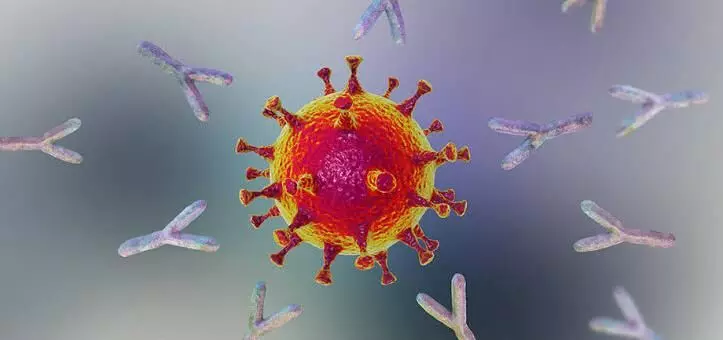
Elderly patients develop more Covid-19 antibodies than younger ones: Study
text_fieldsChandigarh: A new study has found that elderly patients aged above 60 have been found with more antibodies after recovering from Covid-19 than the younger ones in Punjab.
The research done by a joint team of doctors from the Adesh Institute of Medical Sciences and Research, Bathinda, and All India Institute of Medical Sciences, New Delhi found a strong correlation between the level of antibodies and age.
Although other factors such as the severity of disease, hospitalisation or need for oxygen or mechanical ventilation led to a rise in antibody levels, they were not statistically significant.
The study titled 'Heterogeneity in SARS-CoV-2 IgG response titre in patients recovered from Covid-19' has been conducted by Dr Avneet Garg, Dr Rakendra Singh, Dr Mansimranjit Kaur, Dr Surbhi, Dr Ashish Jindal, Dr Saranpal Singh, Dr Avtar Singh Bansal and Dr Vinita Jindal of Adesh Institute of Medical Sciences and Research and Dr Hariharan Iyer and Dr Hem C Sati of AIIMS, Delhi. The findings have been published in the international scientific journal Monaldi Archives for Chest Disease.
The prospective study was conducted to examine the correlation of various factors such as age, gender, the severity of disease and associated comorbidities with antibody response in recovered patients.
A total of 92 patients were recruited at Adesh Institute of Medical Sciences and Research on an outpatient basis from August 1, 2020 to February 28, 2021, between five and eight weeks post-onset of Covid symptoms.
Of the total participants, 37% were above the age group of 60 while 44.6% were in the age bracket of 36-60 and the remaining were below 35. A majority of them suffered from mild infections (51.1%) while a significant number had moderate to severe infections (48.9%) and required hospitalisation. About 46% of patients required oxygen therapy during their stay and 19.6% required high flow oxygen or mechanical ventilation.
Except for one participant, all developed antibodies. The patient, who failed to develop antibodies, was diagnosed case of Granulomatosis polyangiitis (GPA) — a condition that causes inflammation of the blood vessels — and was receiving rituximab maintenance therapy. The median antibody titres were 61AU/ml in the range of 1-135.
On comparing the antibody levels among the different age groups, older age was associated with statistically significant higher antibody response. The age group of 60 and above had statistically significant higher antibody titres when compared to the below 35 age group. The level of antibody in patients aged above 60 was recorded at 71 AU/ml while the younger patients in the age group of below 35 had 28 AU/ml and 53 AU/ml in the age group between 35 and 60. Higher antibody titres of 66.5 AU/ml were noted in male participants against 55.5 AU/ml in female patients.
The highest antibody titre of 135 AU/ml of the study was found in patients recovered from mild infection. The average antibodes among severe patients was 67AU/ml against 59 AU/ml in moderate patients and 54 AU/ml in patients who had a mild infection.
"The strengths of the current study are an in-depth analysis of the association of various demographical, clinical and radiological parameters and antibody titres which have helped to partly elucidate the pattern of immunological response," said Dr Vinita Jindal.























